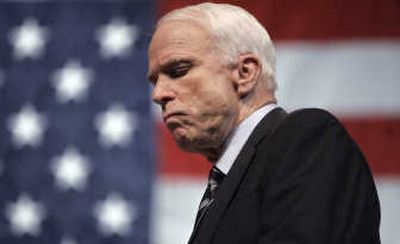McCain urges new, tougher Iran sanctions

WASHINGTON – Addressing a prominent Jewish lobbying group, John McCain called Monday for tougher sanctions against Iran as that country’s president issued another verbal broadside against the United States and Israel.
McCain, the likely Republican presidential nominee, said new sanctions should restrict Tehran’s ability to import refined gasoline and rein in operations of the Central Bank of Iran. He called on European nations to impose new travel restrictions on Iranian leaders and to freeze their assets, and backed a broad international divestment campaign targeting companies that do business in Iran.
In speaking before the American Israel Public Affairs Committee, known as AIPAC, McCain offered one of the most detailed accounts to date of his Iran policy. He again attacked Sen. Barack Obama, the leading Democratic presidential contender, for saying he would meet with Iranian leaders.
The question of whether the U.S. president should negotiate with the Iranian leadership has grown into a sharp dispute in the presidential contest.
A summit with Iranian President Mahmoud Ahmadinejad would yield only “anti-Semitic rants and a worldwide audience for a man who denies the Holocaust,” McCain argued.
“Such a spectacle would harm Iranian moderates and dissidents,” he added, “as the radicals and hard-liners strengthen their position and suddenly acquire the appearance of respectability.”
The Obama campaign shot back Monday. Rep. Adam Schiff, D-Calif., speaking on behalf of the Obama campaign, said McCain’s Iran policy was going to be no different than that of President Bush.
“I think after looking at the last several years of complete disengagement, or an on-again, off-again focus on Iran, that a willingness to have some sort of direct engagement is a productive change in policy,” Schiff said in a conference call.
Obama will speak at AIPAC’s annual conference Wednesday. He is expected to outline his Middle East policy as well as voice support for Israel.
Although a small part of the overall national electorate, Jewish voters represent an important block of potential swing voters in several battleground states, most notably Florida. Both McCain and Obama have signaled that they intend to compete for the backing of Jewish voters.
Within Israel, the perceived threat from Iran has been intensified by the anti-Semitic comments by Ahmadinejad. The Iranian president lashed out again Monday.
Speaking on the 19th anniversary of the death of Ayatollah Ruhollah Khomeini, Ahmadinejad said he believed Israel had “reached the end of its work and will soon disappear off the geographical scene.” He added that the “satanic power” of the United States had begun to erode.
Despite such comments, a majority of Americans support Obama’s position that America should talk with Iranian leaders. A Gallup poll released Monday showed large majorities of Democrats and independents support having the president meet with leaders of countries considered enemies of the United States.
Asked specifically about Iran, 59 percent of Americans said it was a good idea for the U.S. president to meet with the Iranian president, according to the poll.